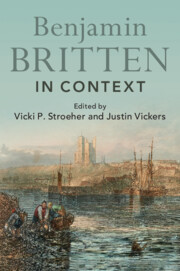Book contents
- Benjamin Britten in Context
- Composers in Context
- Benjamin Britten in Context
- Copyright page
- Dedication
- Contents
- Figures
- Tables
- Notes on Contributors
- Acknowledgements
- Bibliographic and In-Text Abbreviations
- Prologue
- Part I The Britten Circle(s)
- Part II British Musical Life
- Part III Britten and Other Composers
- Part IV Wordsmiths, Designers, and Performers
- Chapter 24 W. H. Auden
- Chapter 25 Eric Crozier
- Chapter 26 Two Librettists
- Chapter 27 The Wise, Queer Heart of Englishness
- Chapter 28 William Plomer’s Poetics of Exile at Home
- Chapter 29 ‘Don’t Colour Them, the Music Will Do That’
- Chapter 30 Designing and Dancing Britten
- Chapter 31 Pears as Illuminator, Interpreter, and Inspiration
- Chapter 32 Britten’s Singers
- Chapter 33 Britten’s Performers: Those Most ‘Instrumental’
- Part V British Sociocultural, Religious, and Political Life
- Further Reading
- Index
Chapter 26 - Two Librettists
Montagu Slater and Ronald Duncan
from Part IV - Wordsmiths, Designers, and Performers
Published online by Cambridge University Press: 31 March 2022
- Benjamin Britten in Context
- Composers in Context
- Benjamin Britten in Context
- Copyright page
- Dedication
- Contents
- Figures
- Tables
- Notes on Contributors
- Acknowledgements
- Bibliographic and In-Text Abbreviations
- Prologue
- Part I The Britten Circle(s)
- Part II British Musical Life
- Part III Britten and Other Composers
- Part IV Wordsmiths, Designers, and Performers
- Chapter 24 W. H. Auden
- Chapter 25 Eric Crozier
- Chapter 26 Two Librettists
- Chapter 27 The Wise, Queer Heart of Englishness
- Chapter 28 William Plomer’s Poetics of Exile at Home
- Chapter 29 ‘Don’t Colour Them, the Music Will Do That’
- Chapter 30 Designing and Dancing Britten
- Chapter 31 Pears as Illuminator, Interpreter, and Inspiration
- Chapter 32 Britten’s Singers
- Chapter 33 Britten’s Performers: Those Most ‘Instrumental’
- Part V British Sociocultural, Religious, and Political Life
- Further Reading
- Index
Summary
Britten’s two early operas, Peter Grimes and The Rape of Lucretia, were collaborations with two very different librettists. Both were poets, but the first, Montagu Slater, was also a communist, a practised journalist, novelist, editor, and critic, a decade older than Britten, and he brought considerable scenario, playwriting, and theatrical experience to the project; the second, Ronald Duncan, also a playwright, was an anti-democratic pacifist, convinced of the power of poetic expression and of his value as a poet; he was more willing than Slater to adapt to Britten’s demands, but still had very decided ideas of his own. Britten abandoned Slater after Peter Grimes, despite its success, and The Rape of Lucretia proved the only opera he would write with Duncan. This essay provides a detailed biographical and critical outline of each writer’s work up to their collaboration with Britten, showing how their approaches to writing a libretto differed, what they contributed, and why Britten moved on to other writers for his subsequent operatic work.
Keywords
- Type
- Chapter
- Information
- Benjamin Britten in Context , pp. 232 - 240Publisher: Cambridge University PressPrint publication year: 2022

